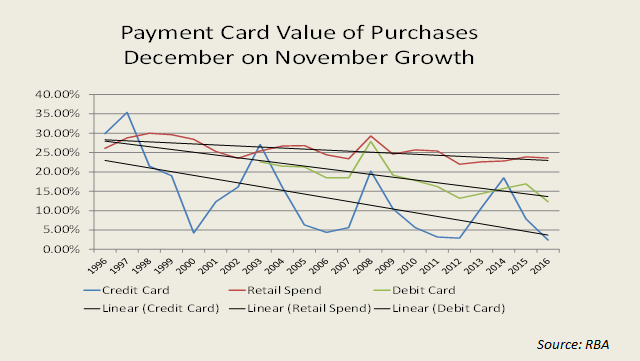-
Australian retailers and merchants in general used to rely on a significant lift in turnover from November to December.
The congruence of Christmas and holidays delivered a welcome boost to cash registers around the country as people prepared for the traditional giving of gifts followed by a few weeks at the beach or in the hills to recharge the battery.
" The data show a major change for retail: the blunting of the Christmas spending spike."
Mike Ebstien, Founder & Principal, MWE ConsultingToday of course, the term ‘cash register’ is a bit of a misnomer as fewer and fewer payments are made with cash.
In just five years, the average debit cardholder has reduced the number of ATM withdrawals they make by an extraordinary 40 per cent as debit and credit cards are increasingly used in preference to cash.
But the data show another major change: the blunting of the Christmas spending spike.
DOWN A LITTLE
While December continues to be of huge importance to retailers, the month-on-month lift in retail sales has gradually reduced over the last 20 years. In the mid 1990s to the turn of the century, retailers could expect a spike in sales from November to December of 25 per cent to 30 per cent. Today that lift is still material but generally closer to 23 per cent. Down a little but not a dramatic fall.
{CF_IMAGE}
Within the context of a modest decline in the total retail spending spike has been a much greater decline in the month-on-month lift in credit card spend and to a lesser extent, the lift in debit card spend.
In 1996 when the spike in retail spend was 26.1 per cent, credit card spend jumped by 29.9 per cent - but only once in the ensuing 20 years did the increase in credit card spend in December exceed retail spend.
Fast forward to December 2016 and retail spend rose by 23.6 per cent from November to December whilst credit card spend was up by just 2.4 per cent.
At first glance, this appears to be a negative implication for payment card use in the biggest spending month of the year. But we’re not Christmas Grinches for the payments industry.
The first aspect we considered was a transfer or extension of spending spike to other months. This does not appear to be the case; for example, there is scant evidence card spend is being delayed until the January sales.
ALTERNATIVE
We think the answer lies in our earlier reference to the increasing use of cards as a payment alternative to cash and other options.
Twenty plus years ago, credit cards were primarily used for relatively high-value discretionary spend such as travel and entertainment with debit cards used for lower value everyday commodity items.
Today both credit and debit cards are much more frequently used for ordinary purchases.
The jump in card sales in December once reflected the use of cards for the purchase of gifts and preparatory holiday spend. This constituted a significant proportion of card use which at the time was largely devoid of what are today considered mainstream card applications.
It’s easy to forget the acceptance of payment cards was unusual twenty plus years ago at the likes of medical practices, schools, utilities, insurance, bill payment and even supermarkets.
The broadening use of cards has reduced the impact of seasonal influences so the monthly distribution of use is much more balanced.
This increase in use can be gauged by considering in December 1996 there were 28.8 million purchases made with a credit card but by December 2016 that had grown to 239.1 million.
Yet this number was eclipsed by 468.7 million purchases made with a debit card so in December 2016, there were 707.8 million purchases using credit and debit cards.
The spike has diminished, not as a result of alternative payment options but due to the wider use of cards across the economy.
No longer do they just come out pre Christmas for discretionary spending but now, via plastic or the mobile, they constitute a major and more balanced payment option.
Mike Ebstein is Founder & Principal at MWE Consulting
The views and opinions expressed in this communication are those of the author and may not necessarily state or reflect those of ANZ.
-
EDITOR'S PICKS
-
When Shijin (Sking) Zeng, founder of one of Auckland’s largest online shops iFurniture, decided to move to New Zealand he dreamed of setting up his own business.
30 January 2017 -
The decline of cheques, the move to a cashless society and the increasing use of smartphones are just some of the trends sweeping the payments world –and on a global scale, New Zealand is ahead of the curve.
20 February 2017 -
The shock-and-awe attack by Indian Prime Minister Narendra Modi on the cash economy, when he used his fiat powers to eradicate fiat currency – unilaterally cancelling high value currency notes – was just the latest in a long line of attempts to crush so-called 'black' economies.
1 February 2017

